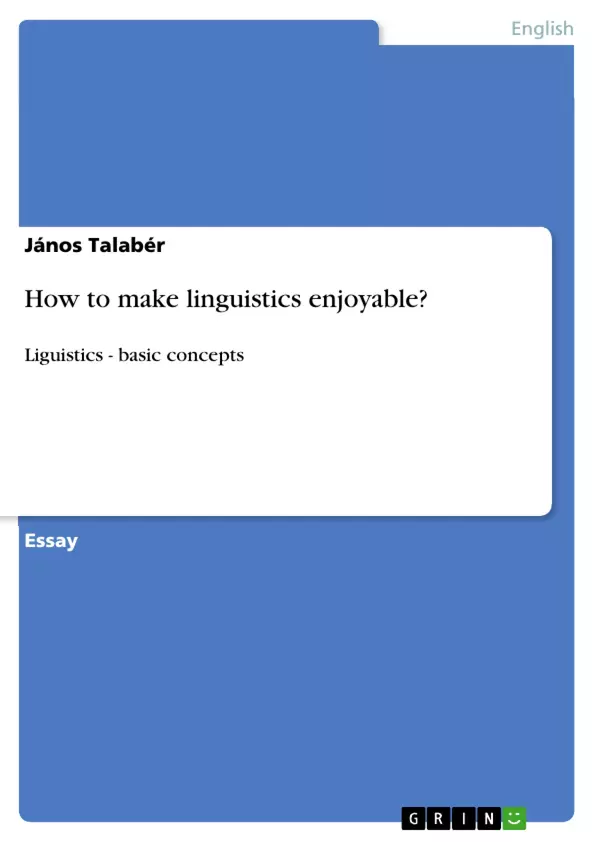How to make linguistics enjoyable?
What is linguistics for me and linguistics approaches in everyday speech?
I studied linguistics before, or at least my college professor did all the efforts to teach me. I have never been against it; however, it is rather hard to grab the essence of this wonderful discipline sometimes. For all this, I would give it a try. In the first Unit we come across an interesting dialog between two teenagers, actually presenting a joke of which punchline is perfectly collaborated and understood by all of them. The principle task is to collect similar dialogs and analyze them from a linguistic point of view. I do not want to repeat the linguistic analysis of the two kids exploring the joke of the chicken that crossed the road, therefore I have tried to seek similar examples. In order to work out a life-like situation, I have opted for two names; let us have Jessica and James talking to each other in the first dialog.
Inhaltsverzeichnis (Table of Contents)
- Chapter One: What is linguistics for me and linguistics approaches in everyday speech?
- Forms, words, morphemes
- Compound (endocentric, exocentric and so on
Zielsetzung und Themenschwerpunkte (Objectives and Key Themes)
The objective of this text is to explore basic linguistic concepts through the analysis of everyday speech examples, focusing on how language is used creatively and intuitively in real-life conversations. The analysis utilizes examples of jokes and dialogues to illustrate key linguistic principles.
- Linguistic approaches in everyday speech
- Analysis of morphemes, particularly cranberry morphemes
- Examination of compound words (endocentric and exocentric)
- The role of creativity and arbitrariness in language use
- Cross-linguistic comparison (English and Hungarian)
Zusammenfassung der Kapitel (Chapter Summaries)
Chapter One: What is linguistics for me and linguistics approaches in everyday speech?
This chapter uses examples of jokes and dialogues between English speakers to illustrate several linguistic concepts such as duality of patterning, creativity, arbitrariness, equality, and tacitness. The examples highlight how native speakers effortlessly understand nuances in language that non-native speakers may find challenging, emphasizing the role of social and cultural context in language comprehension.
Forms, words, morphemes
This section focuses on morphemes, the smallest units of meaning in a language. It defines and gives examples of cranberry morphemes, which are morphemes where one part doesn't have a readily understandable meaning in isolation (e.g., "cran" in "cranberry"). The author explores Hungarian examples, noting challenges in finding perfect equivalents to English cranberry morphemes.
Compound (endocentric, exocentric and so on)
This section analyzes various English compound words, categorizing them as either endocentric (where the meaning is a combination of the constituent parts) or exocentric (where the meaning cannot be derived from the parts). Examples such as "billboard," "fast food," "software," "city center," and "airbag" are analyzed to illustrate the different types of compounding and the evolution of word meaning over time.
Schlüsselwörter (Keywords)
Key terms and concepts explored in this text include: linguistics, everyday speech, duality of patterning, creativity, arbitrariness, tacitness, morphemes, cranberry morphemes, compound words, endocentric, exocentric, English language, Hungarian language, cross-linguistic comparison, and language acquisition.
Frequently Asked Questions
What are "cranberry morphemes"?
Cranberry morphemes are the smallest units of meaning that have no independent meaning outside of a specific word, such as "cran" in "cranberry."
What is the difference between endocentric and exocentric compounds?
Endocentric compounds (like "city center") derive their meaning from their parts. Exocentric compounds (like "airbag" or "software") have a meaning that is not immediately obvious from combining the two words.
How can linguistics be observed in everyday speech?
Concepts like arbitrariness, creativity, and duality of patterning are present in everyday jokes and dialogues, showing how language is used intuitively by native speakers.
Why do non-native speakers sometimes struggle with linguistic nuances?
Language comprehension often relies on social and cultural context ("tacitness") which native speakers understand effortlessly but learners must study consciously.
Does the text compare English with other languages?
Yes, the author provides a cross-linguistic comparison between English and Hungarian, particularly regarding the translation of specific morphemes and compound structures.
- Citation du texte
- dr János Talabér (Auteur), 2008, How to make linguistics enjoyable?, Munich, GRIN Verlag, https://www.grin.com/document/123076



